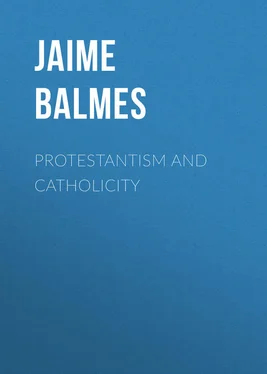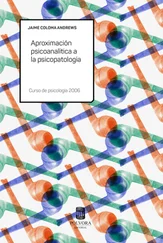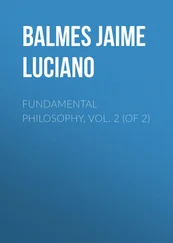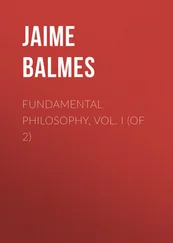Jaime Balmes - Protestantism and Catholicity
Здесь есть возможность читать онлайн «Jaime Balmes - Protestantism and Catholicity» — ознакомительный отрывок электронной книги совершенно бесплатно, а после прочтения отрывка купить полную версию. В некоторых случаях можно слушать аудио, скачать через торрент в формате fb2 и присутствует краткое содержание. Жанр: foreign_antique, foreign_prose, на английском языке. Описание произведения, (предисловие) а так же отзывы посетителей доступны на портале библиотеки ЛибКат.
- Название:Protestantism and Catholicity
- Автор:
- Жанр:
- Год:неизвестен
- ISBN:нет данных
- Рейтинг книги:3 / 5. Голосов: 1
-
Избранное:Добавить в избранное
- Отзывы:
-
Ваша оценка:
- 60
- 1
- 2
- 3
- 4
- 5
Protestantism and Catholicity: краткое содержание, описание и аннотация
Предлагаем к чтению аннотацию, описание, краткое содержание или предисловие (зависит от того, что написал сам автор книги «Protestantism and Catholicity»). Если вы не нашли необходимую информацию о книге — напишите в комментариях, мы постараемся отыскать её.
Protestantism and Catholicity — читать онлайн ознакомительный отрывок
Ниже представлен текст книги, разбитый по страницам. Система сохранения места последней прочитанной страницы, позволяет с удобством читать онлайн бесплатно книгу «Protestantism and Catholicity», без необходимости каждый раз заново искать на чём Вы остановились. Поставьте закладку, и сможете в любой момент перейти на страницу, на которой закончили чтение.
Интервал:
Закладка:
This system of constant preaching and instruction, practised at all times and in all places by the Catholic Church, is so important for the enlightenment and morality of nations, that it must be looked upon as a great good, that the first Protestants, in spite of their desire to destroy all the practices of the Church, have nevertheless preserved that of preaching. We need not be insensible on this account to the evils produced at certain times by the declamation of some factious or fanatical ministers; but as unity had been broken, as the people had been precipitated into the perilous paths of schism, we say that it must have been extremely useful for the preservation of the most important notions with respect to God and man and the fundamental maxims of morality, that such truths should be frequently explained to the people by men who had long studied them in the sacred Scriptures. No doubt the mortal blow given to the hierarchy by the Protestant system, and the degradation of the priesthood which was the consequence, have deprived its preachers of the sacred characteristics of the Holy Spirit; no doubt it is a great obstacle to the efficacy of their preachers, that they cannot present themselves as the anointed of the Lord, and that they are only, as an able writer has said, men clothed in black, who mount the pulpit every Sunday to speak reasonable things ; but at least the people continue to hear some fragments of the excellent moral discourses contained in the sacred Scriptures, they have often before their eyes the edifying examples spread over the Old and New Testament, and, what is still more precious, they are reminded frequently of the events in the life of Jesus Christ, – of that admirable life, the model of all perfection, which, even when considered in a human point of view, is acknowledged by all to be the purest sanctity par excellence , the noblest code of morality that was ever seen, the realization of the finest beau idéal that philosophy in its loftiest thoughts has ever conceived under human form, and which poetry has ever imagined in its most brilliant dreams. This we say is useful and highly salutary; for it will always be salutary for nations to be nourished with the wholesome food of moral truths, and to be excited to virtue by such sublime examples.
CHAPTER XV.
DIFFICULTIES WHICH CHRISTIANITY HAD TO OVERCOME IN THE WORK OF SOCIAL REGENERATION. – OF SLAVERY. – COULD IT BE DESTROYED WITH MORE PROMPTNESS THAN IT WAS BY CHRISTIANITY?
Although the Church attached the greatest importance to the propagation of truth, although she was convinced that to destroy the shapeless mass of immorality and degradation that met her sight, her first care should be to expose error to the dissolving fire of true doctrines, she did not confine herself to this; but, descending to real life, and following a system full of wisdom and prudence, she acted in such a manner as to enable humanity to taste the precious fruit which the doctrines of Jesus Christ produce even in temporal things. The Church was not only a great and fruitful school; she was also a regenerative association ; she did not diffuse her general doctrines by throwing them abroad at hazard, merely hoping that they would fructify with time; she developed them in all their relations, applied them to all subjects, inoculated laws and manners with them, and realized them in institutions which afforded silent but eloquent instructions to future generations. Nowhere was the dignity of man acknowledged, slavery reigned everywhere; degraded woman was dishonored by the corruption of manners, and debased by the tyranny of man. The feelings of humanity were trodden under foot, infants were abandoned, the sick and aged were neglected, barbarity and cruelty were carried to the highest pitch of atrocity in the prevailing laws of war; in fine, on the summit of the social edifice was seen an odious tyranny, sustained by military force, and looking down with an eye of contempt on the unfortunate nations that lay in fetters at its feet.
In such a state of things it certainly was no slight task to remove error, to reform and improve manners, abolish slavery, correct the vices of legislation, impose a check on power, and make it harmonize with the public interest, give new life to individuals, and reorganize family and society; and yet nothing less than this was done by the Church. Let us begin with slavery. This is a matter which is the more to be fathomed, as it is a question eminently calculated to excite our curiosity and affect our hearts. What abolished slavery among Christian nations? Was it Christianity? Was it Christianity alone, by its lofty ideas on human dignity, by its maxims and its spirit of fraternity and charity, and also by its prudent, gentle, and beneficent conduct? I trust I shall prove that it was. No one now ventures to doubt that the Church exercised a powerful influence on the abolition of slavery; this is a truth too clear and evident to be questioned. M. Guizot acknowledges the successful efforts with which the Church labored to improve the social condition. He says: "No one doubts that she struggled obstinately against the great vices of the social state; for example, against slavery." But, in the next line, and as if he were reluctant to establish without any restriction a fact which must necessarily excite in favor of the Catholic Church the sympathies of all humanity, he adds: "It has been often repeated that the abolition of slavery in the modern world was entirely due to Christianity. I believe that this is saying too much; slavery existed for a long time in the bosom of Christian society without exciting astonishment or much opposition." M. Guizot is much mistaken if he expects to prove that the abolition of slavery was not due exclusively to Christianity, by the mere representation that slavery existed for a long time amid Christian society. To proceed logically, he must first see whether the sudden abolition of it was possible, if the spirit of peace and order which animates the Church could allow her rashly to enter on an enterprise which, without gaining the desired object, might have convulsed the world. The number of slaves was immense; slavery was deeply rooted in laws, manners, ideas, and interests, individual and social; a fatal system, no doubt, but the eradication of which all at once it would have been rash to attempt, as its roots had penetrated deeply and spread widely in the bowels of the land.
In a census of Athens there were reckoned 20,000 citizens and 40,000 slaves; in the Peloponnesian war no less than 20,000 passed over to the enemy. This we learn from Thucydides. The same author tells us, that at Chio the number of slaves was very considerable, and that their defection, when they passed over to the Athenians, reduced their masters to great extremities. In general, the number of slaves was so very great everywhere that the public safety was often compromised thereby. Therefore it was necessary to take precautions to prevent their acting in concert. "It is necessary," says Plato ( Dial. 6, de Leg. ), "that slaves should not be of the same country, and that they should differ as much as possible in manners and desires; for experience has many times shown, in the frequent defections which have been witnessed, among the Messenians, and in other cities that had a great number of slaves of the same language, that great evils commonly result from it." Aristotle in his Government (b. i. c. 5) gives various rules as to the manner in which slaves ought to be treated; it is remarkable that he is of the same opinion as Plato, for he says: "That there should not be many slaves of the same country." He tells us in his Politics (b. ii. c. 7), "That the Thessalians were reduced to great embarrassments on account of the number of their Penestes, a sort of slaves; the same thing happened to the Spartans on account of the Helotes. The Penestes have often rebelled in Thessaly; and the Spartans, during their reverses, have been menaced by the plots of the Helotes." This was a difficulty which required the serious attention of politicians. They did not know how to prevent the inconveniences induced by this immense multitude of slaves. Aristotle laments the difficulty there was in finding the best way of treating them; and we see that it was the subject of grave cares; I will transcribe his own words: "In truth," he says, "the manner in which this class of men ought to be treated is a thing difficult and full of embarrassment; for if they are treated mildly, they become insolent, and wish to become equal to their masters; if they are treated harshly, they conceive hatred, and conspire."
Читать дальшеИнтервал:
Закладка:
Похожие книги на «Protestantism and Catholicity»
Представляем Вашему вниманию похожие книги на «Protestantism and Catholicity» списком для выбора. Мы отобрали схожую по названию и смыслу литературу в надежде предоставить читателям больше вариантов отыскать новые, интересные, ещё непрочитанные произведения.
Обсуждение, отзывы о книге «Protestantism and Catholicity» и просто собственные мнения читателей. Оставьте ваши комментарии, напишите, что Вы думаете о произведении, его смысле или главных героях. Укажите что конкретно понравилось, а что нет, и почему Вы так считаете.












